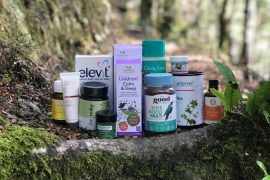By Megan Douglas
When I see how greatly allergies affect many families, I sometimes think that we are in the throes of a pandemic. At a bewildering rate, people in the developed world are succumbing to a raft of allergies. Hay fever is on the rise amongst all sectors of the population, whilst our children, in particular, are suffering from a rise in skin and food allergies. For those of us who live in the western world, 50% of the population is now estimated to be sensitive to at least one allergy-inducing substance. These are worrying statistics; ones we should all be concerned about.
First of all, it’s worth examining what an allergy is. We are said to have an allergy when our body reacts abnormally to a substance that is usually harmless (think pollen, animal fur, milk, nuts, eggs etc.), but which impacts negatively on our immune system when we touch, inhale or ingest it. Allergies can affect different parts of our body, especially the skin, the respiratory system, the gastrointestinal system, and the cardiovascular system. Symptoms can include responses as diverse as sneezing, cramps, vomiting, diarrhoea, difficulty breathing, rashes, and swelling.
There are, then, many different types of allergies, each of them with their own set of symptoms. But what is causing their precipitous rise?
On this, the jury is – unfortunately – out. A raft of different ideas has been forwarded by experts to explain the growth in allergies, particularly amongst children. These theories include the well-known ‘hygiene hypothesis’, which lays the blame at the door of excessive cleanliness, whilst other mooted reasons include our changing diet, climate change, pollution, genetically modified food, declining bio-diversity, synthetic chemicals in personal care products, and even an over-sensitivity amongst parents, who ascribe allergies to their children whenever they get sick. Another, more recent theory, points to the overuse of antibacterial products (like antibiotics) as a key reason for the outbreak of the pandemic.
Whatever the reason, the fact that we are experiencing a rise in the incidence of allergies is inescapable. And until researchers are able to come up with a definitive answer (or answers) as to the root causes of this phenomenon, it falls upon us to be aware of it and to respond to it on a case-by-case basis.
Let’s look at three of the most common types of allergies – hay fever, food allergies, and eczema – and explore what can be done.
Hay Fever
Hay fever is a common problem, caused by an allergenic reaction to airborne pollen. It can be a real irritant when all you want to do is enjoy the sun and those long summer days. Conventional remedies include nasal sprays, decongestants and eye drops, whilst allergy shots are sometimes prescribed by doctors when symptoms become severe.
Personally, I prefer a natural solution and would recommend trying the following options, which may well serve to minimise the incidences and severity of the hay fever:
- Drink green tea, which is a powerful antioxidant.
- Take garlic as a supplement. Garlic contains the compound quercetin, which is a natural antihistamine that may reduce the severity of the allergy.
- Drink lots of water (as many as eight glasses a day) as this will help to break down any mucus and relieve symptoms.
- Be sure to wash clothes that have been worn to the beach, or out in the garden where they can collect pollen and dust.
Food Allergies
Food allergies are problematic, especially where our children are concerned. Although more is becoming known about food allergies each day, there is still no cure and there are hundreds of deaths annually across the western world from anaphylactic reactions to foods. Also, with all that is known about preventing food allergies, peanut allergies are still increasing in children. And too many food labels remain confusing. It is not as easy as it should be to find hidden ingredients in foods that your child might be allergic to.
So what can be done? It’s not enough to hope that your child will simply grow out of their allergy. Thus, whilst there is a better than even chance of your child growing out of an allergic reaction to eggs, the odds are much lower if their allergy is to fish or nuts. And the more serious the allergy, the less likely they are to outgrow it.
In the end, the best remedy for food allergies may be prevention. By avoiding high risk foods, it may even be possible to prevent food allergies from ever developing.
Thus, if there exists a history of allergies in your family, it might be wise to consider the following steps with your children:
- Breastfeed exclusively for the first six months of your baby’s life (that means no formula supplements or solid foods) and then continue to breastfeed until your child is at least 12 months old.
- Avoid peanuts and tree nuts while breastfeeding. You may also want to consider avoiding eggs, cow’s milk and fish.
- If you do want to supplement your breastfeeding with formula, use a hypoallergenic formula.
- When your baby starts eating solids, introduce foods one at a time and watch them after they eat. Food allergy reactions usually appear within minutes, but can sometimes take several hours to show up. If you suspect an allergy, keep a diary of everything your child eats and any symptoms.
- As your child gets older, encourage them to eat a wide variety of wholefoods and rotate food choices. It also helps to drink and exercise regularly, as well as minimise intake of refined sugar.
- If your child is diagnosed with an allergy, you can help to address it by paying close attention to food packaging. If an ingredient list isn’t provided, then call the manufacturer or simply don’t use the product.
- Make sure other parents, teachers, and caregivers know what to do in case of a reaction.
Eczema
Eczema is a growing problem and an issue close to my own heart, given personal experience and my interest in skincare.
Worldwide, eczema is now three times more prevalent than asthma, and it continues to manifest in more and more children. For those who are interested, you may want to read this comprehensive article on living eczema free, but I provide a short summary of best practice treatment here.
- Wherever possible, I advocate treating eczema naturally, as pharmaceutical drugs are often designed to minimise the symptoms rather than treat the cause. They can also damage the skin long term as a result of their thinning action on the skin and are sometimes based on steroids which can disrupt normal hormonal functioning.
- Try to find the cause of the eczema. Begin by looking at dietary and environmental intolerances. Milk and wheat are common culprits when it comes to the condition.
- Increase consumption of vitamin C as well as foods rich in omega-3 fatty acids (eg. cold-water fish, flax seeds and walnuts).
- A good multi-vitamin rich in antioxidant vitamins A and E can help, as can the intake of quercetin, which is found in garlic, as well as in cherries, onions and broccoli.
- Use a natural topical application. I highly recommend either The Organic Skin Co.’s Calendula Cream and/or the Mother and Baby Balm from our Nurture Range in this regard.
- Minimise flare-ups by avoiding exposure to environmental triggers.
Finally, as a general approach to warding off all allergies, I highly recommend taking probiotics. Our immune system is predominantly located in the gut and probiotics can help keep this system strong and vital. For this reason, a high quality probiotic supplement can be an important tool in keeping you and your family allergy free.
Allergies are an ever-growing, ever-present problem in our society. It is wise to plan for them and adopt best practice to prevent them. But, when they do occur, make sure you are armed to deal with them. I hope that, in some small way, this article may help you do just that.
Megan Douglas is a fifth generation naturopath and qualified herbal practitioner who passionately believes that a natural, holistic lifestyle can change our lives for the better. As part of a family boasting four generations of naturopaths and herbalists, Megan harnessed this accumulated knowledge and retrained as a herbalist and naturopath. Armed with the skills to develop healthy skincare solutions, Megan established World Organics in 2011, proudly providing the next generation of organic skincare and makeup.Â











